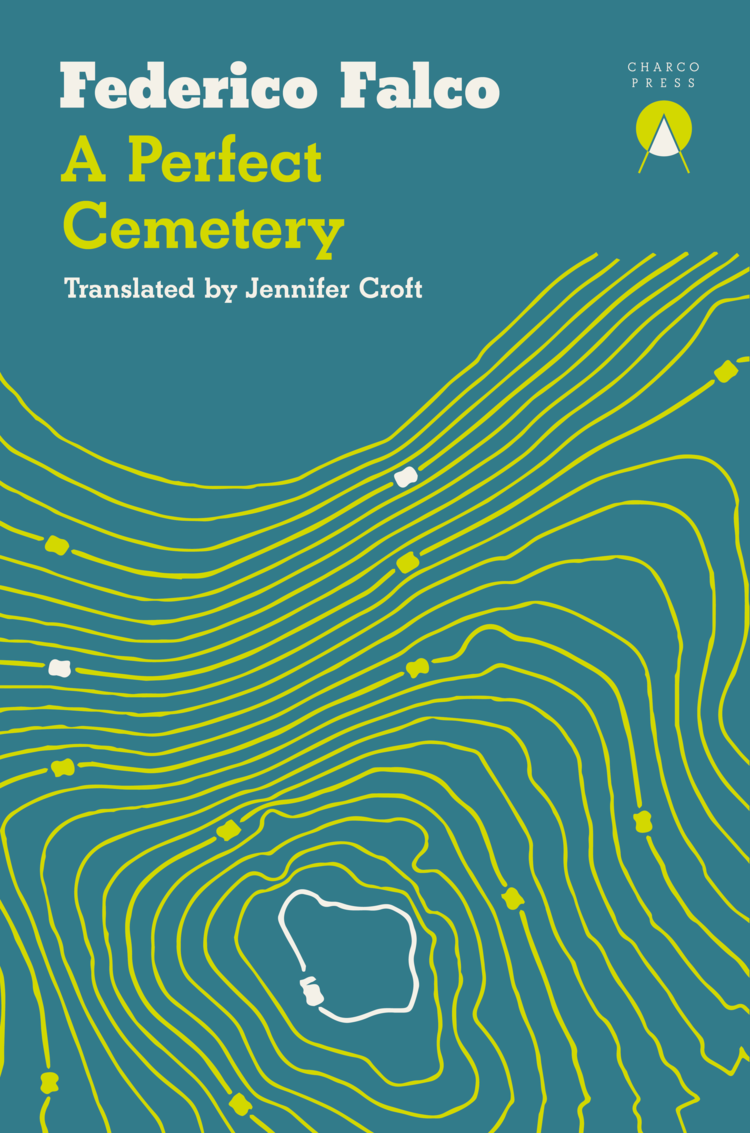•My favorite book I’ve ever translated
•Offspring of Anton Chekhov and Alice Munro
•Three cinematic novellas bookended by two more inward-facing, more experimental short stories
•Falco is most interested in stories of self against society; the impotence of man in the face of nature; the impossibility of capturing our environment with our language; the high drama of reticence and quiet
Conversation in Translation
Jennifer Croft
This is the story of a word. The word is swell.
Like great fictional characters, words have lives of their own, which they lead with perfect disregard for the outward impression of consistency. My latest translation, A Perfect Cemetery by Federico Falco, distinguishes itself from so much other recent fiction—in any language—by the virtues and the flaws of its characters, who are tender and irascible at once. Falco gives them to us in odd, inspired, and decisive pairings: the fretting Alba Clara; the aging and distracted Father Sampacho; the quietly determined Mabel and her father, the forlorn Old Wutrich; the obsessively driven Víctor Bagiardelli; and the spiteful, dying, hilarious Hipólito Giraudo. Every person who helps to populate this book has already made or is about to make a clear and definite mark on the world of her story, creating an environment in which dying can be funny, reality is oneiric, and a brusque, sexual initiation offers access to the sublime.
Charco Press, 2019
When I first met Falco’s characters, I was as far away from them as possible, reading Un cementerio perfecto in a park at a twelve thousand kilometer remove from Buenos Aires, where they were born. Where I was, it was the height of summer; it was the nadir of winter where they came from. Yet each of them was instantly vivid in my mind. I could also hear them, conversing with each other in the silent cinema in which things often take place inside my brain: not Spanish or English or the German that surrounded me then but a kind of fluid protolanguage that was nonetheless clear as a bell.
It was the emotional clarity of the communication between characters in these stories that I most wanted to preserve in my translation. Aside from honoring the author’s palpable love for the landscapes of his native Córdoba Province (some seven hundred kilometers northwest of Buenos Aires), and aside from re-creating the stories’ contours, dazzling and precise as Frank Lloyd Wright’s skylit spiral path, my most pressing concern had to do with dialogue.
The debate over how to represent place in speech has raged among translators for longer than I’ve been alive, and it will continue to spark fervently opposing notions long after I’ve retired. At stake is this question: how do you take a unique and individual form and transform it into something else that is unique and individual and that in some essential way is also identical to the first form? The point of departure and the destination must match, in other words, regardless of the journey undertaken in between.
“Vernacular is both a language always in motion,” writes translator Julia Sanches, “breathing and reinventing itself constantly, and, perhaps paradoxically, some of the most geographically and temporally anchored language a translator can hope to negotiate.” While some translators into English search for the closest systemic equivalent—Valspeak for a certain kind of beachfront youth, Appalachian English for members of insulated communities, New England dialects for characters who hark back to traditions and who may range widely when it comes to social station—others believe that to supplant a specific time and location with a different specific time and location would not only be absurd but would also fully erase the original culture in one fell neocolonial swoop. Such translators must invent a new lexicon and music to house it—from scratch.
The debate rages because the question at its heart isn’t answerable. The fluctuating rootedness Sanches describes can’t exactly be captured, or can’t be captured exactly. There isn’t an answer because translation isn’t a system. Translation is an encounter between two human beings that takes place in words that belong to different systems. Each of these words has changed in its identity over time. It has changed what it means, it has changed how it means it, and it has likely even changed its behavior toward other words. The word conversation first referred to “the action of living or having one’s being in a place or among persons,” or, less frequently, conversion. From the sixteenth to the eighteenth century, it meant sex. It strikes me as an unusually lively word, even when compared with its most peripatetic lexical counterparts.
I can’t say, then, how I approach conversation in translation in general. I can only say how I’ve responded to the specific opportunities presented by the stories of A Perfect Cemetery. Take the end of “Silvi and Her Dark Night”:
¿Cómo va a volver?, preguntó Silvi cuando el avión desapareció, por completo devorado por la claridad y la distancia.
¿Y si se pierde?, preguntó Silvi. ¿Cómo va a saber que estamos acá?
Helmut sonrió. Después abrió los brazos, bien anchos.
Mirá todo esto, dijo. ¿No es hermoso?
Sí, dijo Silvi.
No, pero prestá atención. Mirá de verdad. ¿No es hermoso?
Sí, sí, dijo Silvi.
Helmut asintió, bajó la vista, se mordió los labios.
No te preocupes, dijo. Ya va a volver, dijo. Ya nos va a encontrar.
I have translated this as:
How will it get back? asked Silvi, when the plane disappeared, fully devoured by the light and the distance.
What if it gets lost? asked Silvi. How’s it going to know we’re here?
Helmut smiled. Then he opened his arms, wide.
Take a look at all of this, he said. Isn’t it swell?
Yes, said Silvi.
No, no, pay attention, he said. Take a good look. Isn’t it swell?
Yes, yes, said Silvi.
Helmut nodded, looked down, pursed his lips.
Don’t you worry, he said. It’ll come back, he said. It’ll find us.
Each word of my translation could be a different word instead. Silvi’s first question could be: How’s it going to get back? Or: How will it return? How’ll it come home? Is it going to come back? Will it be able to return?
The variations could go on for pages. The same is true of any line from any story because no word is reducible to any other word. Each translation transmits at least a slightly different feeling. This is what makes the translator so powerful, even if the reader is often unaware of the extent to which her fate is in the translator’s hands.
But there is one word in particular that readers have noticed and have asked about, and naturally it is the word I am least amenable to changing because it is the word to which I’m most attached.
The word is swell. I have translated hermoso, which means “beautiful,” as “swell.” Not “pretty,” not “lovely,” not “nice,” not “extraordinary.” Swell.
If there is one thing I am sure of in the whole of my version of Federico Falco’s book, it is that Helmut asks his daughter to notice how swell the world is, and how swell her future in it will be. Why? For two reasons, neither of which is currently a word: homewardness and selfness.
Perhaps no English-language author is more associated with personality or its cult than Lord Byron, whose fondness for pet words is palpable throughout the more than sixteen thousand lines of his unfinished Don Juan (1819–1824). Swellcomes up five times in Canto XI, when the itinerant Sevillian Don Juan leaves freezing Russia for Lord Byron’s native London:
1. His breath, he from his swelling throat untied
2. A thorough varmint, and a real swell,
3. So prime, so swell, so nutty, and so knowing?
4. For those whom favour or whom fortune swells,
5. There wanted but this requisite to swell
His qualities (with them) into sublime:
The meaning of swell in my translation corresponds closest to 3, but it carries inside it the significance of 5, along with the weight of 1, 2, and 4. Meaning 3 can be found in Hart Crane, Dashiell Hammett, P.G. Wodehouse (“it’s supposed to be swell for the soul”), and many writers more, but the man whose voice I heard when I was translating this grounded and celestial scene between a father and a daughter was my own dad, whose only adjective in circumstances such as these is: swell.
Federico Falco’s stories possess the lightness and the sensitivity of Wisława Szymborska, the empathy of Chekhov, the perfect structures of the greatest architects of any time. They don’t really resemble Lord Byron’s digressive horseplay in verse except that, in both, selves are contradictory, and selves have homes they return to, if only in their minds. Homewardness and selfness are qualities that must be specific in order to be universal; combine them, and my translation of A Perfect Cemetery, originally written in Spanish in Buenos Aires—the place in the world that feels the most like home to me but where I no longer live—must reflect my own origins and orientation just as it grows out of the author’s Córdoba roots and yearning.
So I have intuitively re-created on the page in English what I have seen in the movie versions of these stories in my mind. Falco wrote the screenplay, but I was the director of these sweeping films, just as you have been—as every reader will be. I hear the characters as I must, informed by all the people I have known and loved in all the places I have lived. They don’t all speak the way Oklahomans speak because why would they, and because all Oklahomans do not speak in the same way. They speak according to their personalities, as Falco created them and as I read them, and the translation we have created together is now its own being, likely contradictory as any individual creation must be.
A contemporary critic wrote of Don Juan that its main failing was its contradictions: “We are never drenched & scorched at the same instant while standing in one spot.” But Silvi is a good girl who wants to lick a Mormon who reminds her of a boy whose last rites she helped administer after an accident that has shaken her faith, and in our own irreducible ways, we are all Silvi.
Every time I read “Silvi and Her Dark Night,” or “Woodland Life,” or indeed A Perfect Cemetery, I cry. Mostly with nostalgia: an original grief coupled with the wild joy of making new homes—in languages, in life, in fiction.
Notes: Examples of “swell” and the history of “conversation” come from the Oxford English Dictionary. Byron’s critic was Francis Cohen, whom I read in Michael Caines’s “Isn’t it Byronic?”, published on July 19, 2019, in the TLS.
Federico Falco’s A Perfect Cemetery, translated by me, appeared with Charco Press on April 6, 2021.
This essay appears as a translator’s afterword in A Perfect Cemetery and was published by The Kenyon Review online.


